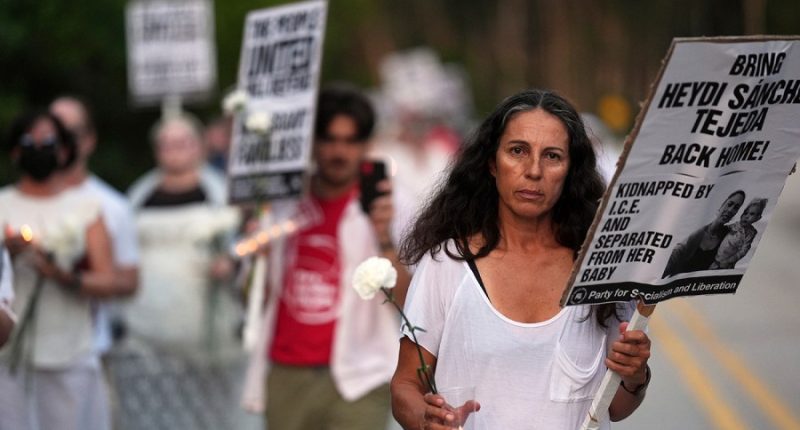Share this @internewscast.com

(The Hill) — The Trump administration is coming under scrutiny for deporting several U.S. citizen children along with their foreign-born parents.
Officials from the Trump administration have justified their actions, stating that the minors were not actually deported. Instead, they argue that the parents chose to accompany their children to avoid being separated from them.
However, lawyers representing these families argue that their clients were barely informed and were compelled to make immediate, pressured decisions regarding their U.S.-born children.
Representative Seth Magaziner (D-R.I.) has been liaising with lawyers on behalf of several families, such as a Honduran mother with two American children, one of whom is a 4-year-old battling stage 4 cancer.
“At no time did the mother offer any consent. At no time did the mother sign anything. Also, the mother was not given the opportunity to speak with legal counsel, even though the lawyer was in the same building at the time,” Magaziner told The Hill.
“There’s a specific set of protocols that ICE is supposed to follow any time they are preparing to remove someone who has a minor child, whether that child is a citizen or not, and that includes providing access to legal counsel, which was not done in any of these cases,” he added, referring to U.S. Immigration and Customs Enforcement (ICE).
That woman, known by the initials RMV, is not alone. Another Honduran mother, JLV, was deported to Honduras with her 2-year-old U.S. citizen child while the father was preparing custody documents.
And then there’s the case of two Mexican parents living in Texas who were deported along with five of their six children after being stopped at a border checkpoint.
The family was en route to Houston for emergency treatment for their 10-year-old, U.S. citizen daughter who had recently had a brain tumor removed.
The Hernandez family, using a pseudonym to protect their privacy, pleaded while in custody for staff to look at documentation from the hospital requesting permission to travel.
Instead, they spent the night in custody before being taken to a bridge and turned over to Mexican authorities in an area rife with kidnappings. The family has since gone into hiding in rural Mexico.
Danny Woodward, an attorney at the Texas Civil Rights Project who is working on the Hernandez family’s case, said the mixed-status family has multiple children who were born in the U.S., as well as one born in Mexico.
“The parents were not offered any sort of meaningful choice about what to do with their daughter or any of their U.S. citizen kids. CBP will repeatedly say, ‘Oh, the parents were all given the choice about what to have happen.’ But what happened in this case is that the parents were repeatedly pressured to sign deportation papers and basically said, ‘Your two options are to take your children back to Mexico, all of them, or hand them over to government custody and you will never see them again,’” he said of the U.S. Customs and Border Patrol agents that dealt with the family.
“That’s not a meaningful choice.”
Rep. Adriano Espaillat (D-N.Y.), chair of the Congressional Hispanic Caucus, met with the Hernandez family in Monterrey, Mexico, earlier this month. He said it’s been disruptive for the family — the daughter isn’t getting treatment, while the U.S. citizen children can’t officially enroll in school.
He’s hoping to get passports for the U.S. citizen children and humanitarian parole for the parents and their one Mexican citizen child. That would allow the family to return to the U.S. so the daughter can continue to get medical care unavailable in Mexico.
“The little girl is not able to get the treatment she needs to get to deal with her illness,” Espaillat said.
“This is happening more than we think it is happening, and that this mass deportation effort by the administration will now, now seems to be kicking in, and it’s sort of like on steroids, right,” he added.
“It’s happening to green card-holders and U.S. citizens, particularly children. So it’s not just an undocumented issue — it’s impacting everybody.”
Sirine Shebaya, executive director for the National Immigration Project, which is representing both of the Honduran women who were deported with their children, said ICE agents in Louisiana did not follow established protocol for handling family situations.
Shebaya said past administrations have not moved to deport the parent of a citizen child if they were not otherwise considered a public safety risk.
“There’s a requirement that parents be given an opportunity to make decisions about what happens with their children, because, obviously, as a U.S. citizen, you have a right to be here. You are not able to be deported. And in this situation, neither of the moms was given an opportunity to make a decision about what happens with their kids,” she said.
Shebaya said the mothers should have been presented with forms, translated into their native language, as well as time to consult with an attorney and other family members, including to arrange the possibility of leaving the child with a designated custodian.
Instead, one was never informed that her lawyer was trying to reach her, and both were told their children would be removed with them.
“The families in Louisiana were evidently and clearly not given any choice in the matter at all, and if they had been given a choice, there would have been documentation of a process and a conversation. It’s also not possible to have the ability to make a choice in less than 24 hours, about two children, one of whom is extremely sick,” she said.
Homeland Security Secretary Kristi Noem framed the matter as an election of the parents, telling Magaziner and other lawmakers during questioning earlier in May that “we do not deport U.S. citizens and have not deported U.S. citizens.”
The Trump administration also lashed out this week following a report from The Washington Post detailing the case of a 2-year-old born in Fort Lauderdale, Fla., to Brazilian parents without legal status in the U.S.
The child, Emanuelly Borges Santos, is now left in bureaucratic limbo. U.S. immigration officials confiscated her parents’ Brazilian travel documents, leaving them unable to secure Brazilian citizenship for their daughter at a consulate in South Florida. When she arrived on a deportation flight with her parents in Brazil, Borges Santos had only her U.S. travel documents, meaning she had to enter the country as a tourist.
That status is set to expire in days, and Borges Santos has no simple way to gain citizenship in a country that, like the U.S., has birthright citizenship or requires foreign births to be registered at consulates abroad.
“The media is force-feeding the public false information that U.S. citizen children are being deported. This is FALSE and irresponsible,” the Department of Homeland Security said in a tweet.
“Parents are asked if they want to be removed with their children or ICE will place the children with someone the parent designates. Parents who are here illegally can take control of their departure through the CBP Home app. The United States is offering illegal aliens $1,000 and a free flight to self-deport now.”
But critics say removals amount to deportation and ignore the complexities faced by such families.
Woodward said that the Hernandez family’s son was out of town when the rest of the family was deported and remains in the U.S.
“He just lost his whole family. He’s been separated from everybody,” he said.
Woodward pointed to comments from border czar Tom Homan, who recently said having U.S. citizen children doesn’t make someone “immune” from immigration laws, and that “families get separated every day by law enforcement.”
Woodward noted parallels with the family separation policy implemented under the first Trump administration.
“Zooming out a little bit, the whole purported point of family separation was to be as cruel as possible to try to send a message to people about coming to the United States,” the attorney said.
“And this is the exact same thing, and that’s the clear, stated intent.”











